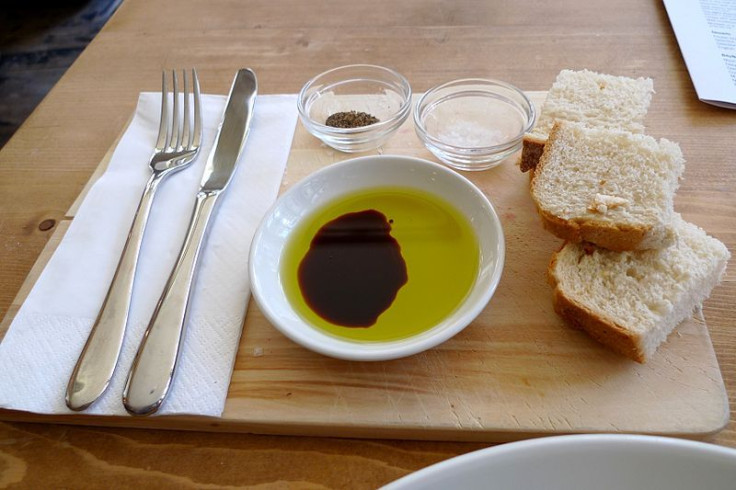Olive Oil Benefits: How High-Fat Extra Virgin Olive Oil Is Good For Your Immune System

Skip the butter and stick margarine in the kitchen and use oil — extra virgin olive — to improve your immune system. The consumption of this oil has increased dramatically in recent years with a United States purchase of 292,925 metric tons (MT) in 2011, reports the U.S. Department of Agriculture (USDA) Foreign Agricultural Service (FAS). This high-fat oil contains 73 grams of monounsaturated fatty acids (MUFAs) and is popularly used as for frying and baking as a healthier replacement for vegetable oil. It can also serve as a dressing for salads. Its health benefits derive from its nutritional content of high MUFAs that are considered to be a healthy dietary fat. MUFAs have been linked to lower cholesterol and control the insulin levels in the body as they replace the saturated fats or trans fats that can increase LDL cholesterol levels and the risk of cardiovascular disease.
Extra virgin olive oil is a good source of antioxidants with vitamins E and K that can protect the body from oxygen-free radicals and promote healthy cognitive function, says the USDA. Implementing olive oil in cooking provides numerous health benefits if used correctly. The nutritional value of olive oil is affected by heat, light, and air. For storage, Mayo Clinic recommends to keep the oil in a dark, room-temperature cupboard or in the refrigerator to preserve the healthy fats and the taste that can wither over a long period of time.
Learn how your immune system can reap the health benefits of extra virgin olive oil through moderate consumption.
Combats Inflammation
The phenolic compound — oleocanthal — found in olive oil has anti-inflammatory properties. A study from the Monell chemical Senses Center in Philadelphia, Pa. examined the effects of daily intake of teaspoons of extra virgin olive oil on pain. Researchers found that four teaspoons of this high-fat oil per day for 12 weeks acted as an anti-inflammatory drug, such as ibuprofen, to reduce pain. While extra virgin oil and ibuprofen have the same effect on treating inflammation, they have different effects on the body. According to Science Daily, ibuprofen can increase bleeding and gastrointestinal damage whereas olive oil has no such effect on the body.
Tip: The amount of oleocanthal differs in olive oils. To see how strong the oleocanthal content is in an olive oil, you can take a sip and see how it stings the back of your throat. The stronger the sting, the more oleocanthal it has, says Arthritis Today.
Combats Diabetes
Diabetics are often told to limit their daily intake of dietary fat because they are at high risk of developing cardiovascular disease. In a landmark government study, it was determined that foods with high MUFAs does not cause weight gain in diabetics and can even reduce the risk of developing type 2 diabetes by approximately 60 percent. MUFAs help diabetics regulate their insulin levels and blood sugar, especially for those who have type 2 diabetes.
Combats Cancer
The consumption of olive oil has been linked to a decrease in tumors of colon, prostate, and breast cancer. Before recent studies, researchers concluded that higher incidences of breast cancer are linked to a high saturated fat diet. In a study published in Annals of Oncology, researchers found that oleic acid — the main MUFA in olive oil — can weaken a cancer gene found in 25 to 30 percent of all breast cancers. What's more, with oleic acid, the effective of the breast cancer drug Herceptin improved dramatically.
Reduces Risk of Cardiovascular Disease
MUFAs in olive oil have been shown to reduce heart problems and rate of heart disease deaths. In a study published in the New England Journal of Medicine, researchers conducted a randomized trial of the Mediterranean diet pattern and its prevention of cardiovascular disease. In Spain, participants who were at high risk of cardiovascular disease but did not develop it yet were assigned to a Mediterranean diet with extra virgin oil, a Mediterranean diet with the addition of mixed nuts, or a control diet with advice on how to reduce dietary fat. Researchers found that a Mediterranean diet with either extra virgin olive oil or mixed nuts can significantly reduce the incidence of cardiovascular disease.
Promotes Healthy Fetal Development
Pregnant women are often advised to include olive oil in their diet due to its high content of omega-3 fatty acids. This heart healthy oil has the ability to improve brain function and learning capacities in young children. The consumption of extra virgin olive oil has been linked to a positive effect on a child's height, weight, and cognitive and behavioral development. In a study published in the Journal of Physiology and Biochemistry, researchers tested the effects of consuming olive oil in relation to body weight gain and foot efficiency as well as placental and fetal development. The results of the study showed that a pregnant rat's consumption of olive oil as the only dietary fat source did not have any detrimental effects on the expectant mother's weight gain or placental and fetal development.
Published by Medicaldaily.com



























